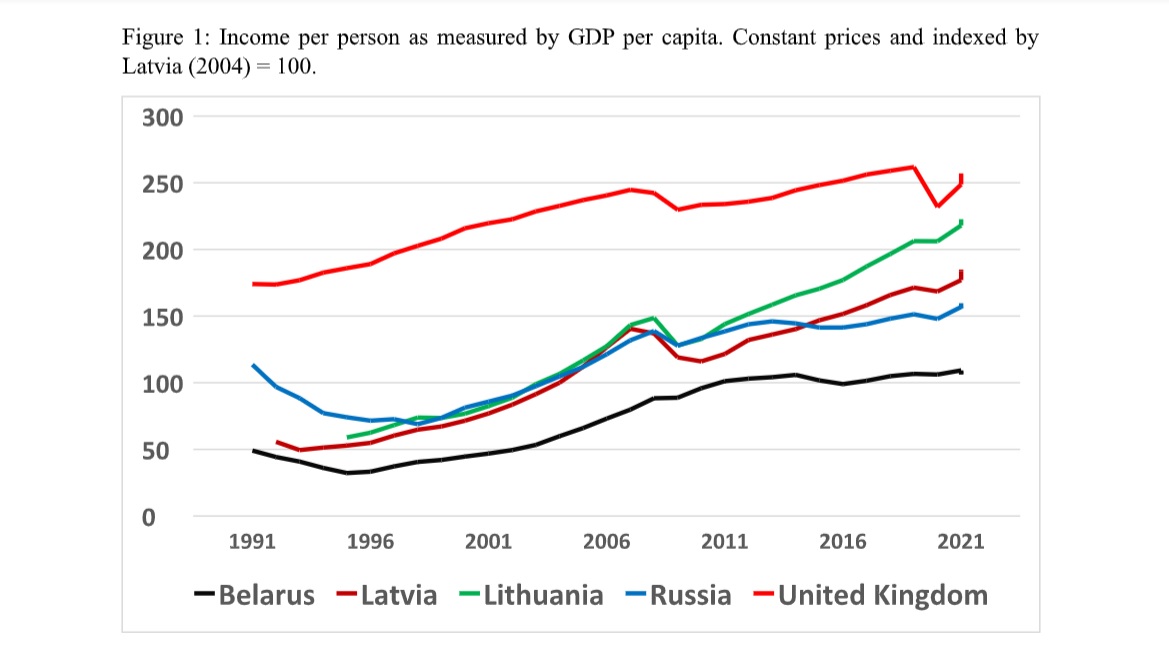A typical metric is to look at Latvia’s level of income per person as a share of the EU average and this has risen substantially from around 40% of the EU level to 71% today.
Allow me a slightly different perspective with a comparison with Lithuania (the most successful 2004 EU entrant, the United Kingdom (the most popular destination for Latvian migration) and Belarus and Russia, our eastern, non-EU (and troublesome) neighbours.
For convenience, I have indexed the numbers in Figure 1 so that Latvia in 2004, the year of accession, is set at 100. We see that income per person was pretty much the same in Latvia, Lithuania and Russia at that time but way behind that of the United Kingdom; this, obviously, being the main reason for much outward migration: higher wages.
We also see that incomes per person – and this is in constant prices (i.e. excluding inflation), have almost doubled in Latvia since 2004 and in Lithuania more than doubled. Latvia overtook Russia in terms of income per person back in 2014, a full ten years ago, and has increased the gap since then.

A slightly different way of looking at these changes is seen in Table 1, which looks at Latvia’s income per person as a share of the level of income per person in the four other countries. Whereas it was only 43% of the UK level in 2004, this has now risen to 72%, providing less incentive for migration.
With respect to Russia the ratio has risen from 98% (i.e. slightly behind) to 116% (i.e. significantly ahead). Latvia was way ahead of Belarus already in 2004 and the difference has even been increased since then. Only with respect to Lithuania is the outlook less rosy. Latvia was somewhat behind in 2004 at 94% of the Lithuanian income level but this has since fallen further to 83%.
Latvia has been successful in terms of income development since joining the European Union. But Lithuania has been even more successful.
Table 1: Latvia’s performance in terms of income per person relative to that of Belarus, Lithuania, Russia and the United Kingdom

But other economic accomplishments are worth noting. Before EU membership, Latvian exports constituted about 40% of GDP. With open borders, this has increased to about 60%, making Latvia one of the most open economies in the EU and taking advantage of these open borders.
Membership has also changed the composition of Latvia's trading partners. In 2004, the three most important export destinations were UK, Germany and Sweden. Today, Lithuania is by far the most important destination for Latvian exports, followed by Estonia.
And the integration into the EU in terms of foreign trade is remarkable. Of the ten main trading partners, eight are in the EU with only Russia (in fourth place) and the UK, a former-EU country (in sixth place) being the exceptions.
Overall, I think EU membership has brought many benefits and I often see this membership as the single most important part of what I consider Latvia’s long journey towards institutions that promote free trade (EU, World Trade Organization, Eurozone), the free market economy (EU, World Bank, IMF, OECD) and democracy and human rights (EU, OSCE).
Latvia has been very consistent and also successful in its aim for promoting these values. Those who would have liked to see closer connections with Russia and its distorted “values” – we could label them “Ždanokists” – have lost out.
The reorientation of the Latvian economy towards the west has been massive since independence and with good economic results for most but before we open the champagne, let us admit to two failures: having been significantly less able to take advantage of EU membership than Lithuania and a level of outward migration that has hurt the economy.
But then, by all means, open the champagne!


























